
Become a member
Join today and help protect nature, beauty and history – for everyone, for ever. Enjoy access to more than 500 places with National Trust membership.
A lavish family home re-imagined as a Venetian Palace in the rural Dorset countryside.
Wimborne Minster, Dorset, BH21 4EA
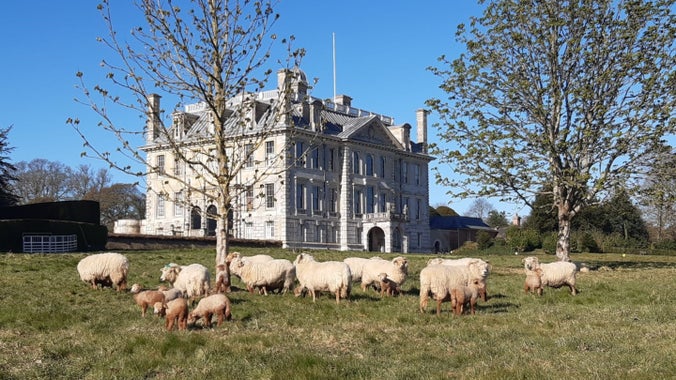
| M | T | W | T | F | S | S |
|---|---|---|---|---|---|---|
Open
Closed
| Asset | Opening time |
|---|---|
| House | 10:30 - 15:00 |
| Car Park | 09:30 - 17:00 |
| Garden | 09:30 - 17:00 |
| Park | 09:30 - 17:00 |
| Stables Café | 09:30 - 17:00 |
| Shop | 10:00 - 17:00 |
| Second-hand bookshop | 10:00 - 17:00 |
| Badbury Rings car park | Dawn - Dusk |
| Kitchen Garden Kiosk | 10:00 - 16:00 |
The house closes at 4pm, with last entry at 3pm. The Kitchen Garden kiosk may close in bad weather.
| Ticket type | With Gift Aid | Without Gift Aid |
|---|---|---|
| Adult (18+) | £23.10 | £21.00 |
| Child (5-17) under 5s free | £11.60 | £10.50 |
| Family (2 Adults and up to 3 children) | £57.80 | £52.50 |
| 1 adult, up to 3 children | £34.70 | £31.50 |
| Group (Adult 18+) | £19.00 | |
| Group (Child 5-17) | £9.50 |
| Ticket type | With Gift Aid | Without Gift Aid |
|---|---|---|
| Adult (18+) | £25.30 | £23.00 |
| Child (5-17) under 5s free | £12.70 | £11.50 |
| Family (2 Adults and up to 3 children) | £63.30 | £57.50 |
| 1 adult, up to 3 children | £38.00 | £34.50 |
| Group (Adult 18+) | £21.85 | |
| Group (Child 5-17) | £10.93 |
Second-hand bookshop located in Laundry Courtyard, just opposite the shop.
Bookshop - more informationA range of sandwiches, light snacks such as soup or sausage rolls, and heartier choices such as one-pot lunches served with bloomers. Cream teas and ice cream. Children's lunchbox. A range of vegetarian and vegan options. Hot and cold drinks (takeaway available). Tables inside and out.
Café - more informationThe main car park is 0.25 miles from the main road down a tarmac driveway. The car park consists of tarmac driveways and loose stone and gravel mix.
Dogs on a lead are welcome in the car park, woodland walks, parkland and the Stables courtyard. Dogs not allowed in the formal garden, immediately behind the house, and in the house. Assistance dogs welcome everywhere.
Dogs allowed - more information5 AC electric vehicle charging points are available in Kingston Lacy's main car park. Chargers can be accessed using mobile app, RFID card, or contactless payment device. Visit our EV charging provider RAW Charging’s website to download the app in advance of your visit.
Electric vehicle charging point - more informationVolunteer-led tours of the garden
Guided tour - more informationVisit the shop in Laundry Courtyard to buy a range of seasonal plants.
Plant shop - more informationLocated in Laundry Courtyard. A range of home furnishings, fashion accessories, kitchen ceramics, plants and seasonal food and drink, including products from local providers
Shop - more informationSignposted as you enter the property. Family toilets with space for buggies and baby-changing facilities are available in Laundry Courtyard.
Blue Badge parking. Mobility scooters for hire. Accessible WC. House partly accessible, virtual tour available. Garden paths mainly gravel.
Path and floor surfaces around the property are tarmac, concrete, gravel, flagstone, grass, tile, marble and carpet. Map of accessible route available from Visitor Reception.
Located in Laundry Courtyard. Two accessible toilets, one with Changing Places unit including hoist and adult-sized changing table.
Braille guides are available from the Front of House team in the main entrance.
There are 14 designated spaces for disabled people, on a gravel surface. Bays are not marked. Car park has tarmac driveways and loose stone and gravel mix for parking bays. The overflow car park is grass. The parking area is 119 metres (130 yards) from Visitor Reception, up a tarmac slope with a 1:20 gradient.
Induction loops at Visitor Reception and in the shop.
Large print guides are available from the Front of House team in the main entrance.
Flooring within the restaurants is cobble stones or wood.
Two entrance ways: one with steps down and the other (signposted) level. Flooring uneven flagstones.
Please leave backpacks and rucksacks in the bag store (free of charge), located in the Laundry Courtyard.
Four powered mobility vehicles are available for loan from Visitor Reception. Pre-booking advised, telephone 01202 883402 (line 2).
Main entrance to the house is up four steps and access to ground, first and second floors is via staircases. Wheelchair users have level access to three rooms on the basement level only, via a door is located in Laundry Courtyard. Please ring the bell for admission if no one is on duty. One of these rooms contains the virtual tour.
Audio-visual virtual reality tour available about the history of the house and the family as well as 360º degree imagery of all rooms. The touch screen is located on a 720mm high table within the interpretation space. The screen is positioned at an angle that can be adjusted. A chair without armrest is available.
Three all-terrain manual wheelchairs (Mountain Trikes) and three manual wheelchairs are available for loan from Visitor Reception, in addition to four powered mobility vehicles. Pre-booking advised, telephone 01202 883402 (line 2).
Entrance to the property what3words ///nearing.daydream.fallback
Poole c.10 miles, Bournemouth c.12 miles.
Bus connections to Wimborne Minster. See below for onward journey.
Services from Bournemouth and Poole to Wimborne Minster, alight Wimborne Square. Taxi advised for onward journey to Kingston Lacy (3 miles). On Tuesdays, Thursdays and Fridays Bus 88 runs from Wimborne to Kingston Lacy car park.
Bus X8 from Blandford Forum to Sturminster Marshall, c.3 miles on foot. On Tuesdays, Thursdays and Fridays Bus 88 runs from Sturminster Marshall to Kingston Lacy.
Cycle parking and facilities: Cycle parking is provided at our Visitor Reception. We have a bike pump, puncture repair kits and plugs available for e-bike charging should you need it.
Directions and access: Cycle route National Route 25 goes to Wimborne Minster from Blandford Forum. Wimborne is 20 minutes away by bike and you can hire Beryl Bikes there (https://beryl.cc/scheme/dorset). Kingston Lacy has its own woodland cycle track. Plan your cycle route using the link below and enter via the Kitchen Garden entrance. Once you have arrived please head to Visitor Reception, either by wheeling your bike through the garden or cycling along the woodland cycle track (access it at the Japanese Garden) until you reach the main driveway. Turn up the drive to the car park, and Visitor Reception is nearby. Once at Visitor Reception scan your National Trust Membership card or pay admission to support the National Trust’s conservation work, which allows access to these special places.
Cyclestreets journey planner: Plan your route to Kingston Lacy using the CycleStreets journey planner link below (This journey planner uses OpenStreetMap data which is generally excellent but accuracy cannot be guaranteed. If you come to a footpath or other cycle-prohibited track, please don’t ride on it).
Further information: In partnership with Dorset Council we run a weekly health cycle rides at Kingston Lacy every Thursday. For more information go to https://www.dorsetcouncil.gov.uk/w/activate-cycle-rides-in-east-dorset
There's always plenty to do at Kingston Lacy. With the days getting longer the garden is starting to unfurl; but don't forget March is your last chance to Meet Rembrandt at our slow looking exhibition.
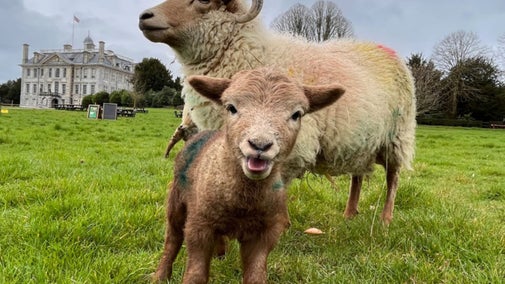
Hop to it! Easter is early this year, so we're starting the fun from 21 March and partying till 12 April. Head to the dedicated Easter field for games and activities for all the family, with a chocolate prize at the end. Trails cost £3.50pp.
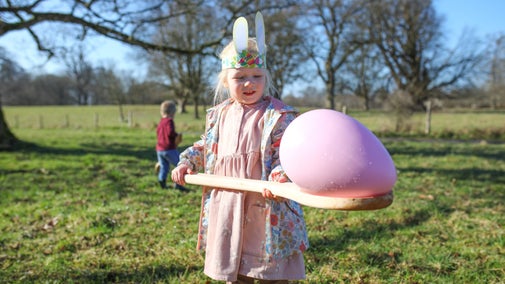
Explore one of Rembrandt's great works at Kingston Lacy. A exhibition that encourages you to slow down and focus. On display in a wheel-chair accessible space until 22 March 2026. NEW! Book to hear the Trust's National Conservator for Visual Arts on the science and skill of conservation.

In 2025 we carried out a major programme of works to improve accessibility at Kingston Lacy. We upgraded the car park with extra disabled parking, EV chargers, landscaping and a pedestrian walkway. We added a Changing Places unit, family-friendly toilets with space for buggies and a quiet room with sensory toys. We upgraded the toilets with a new look and feel. Read on to find out what we've done and how it will improve your visit.
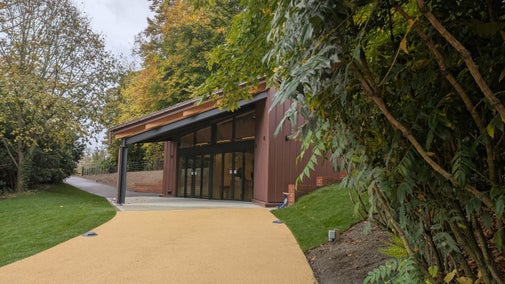
Enjoy nature and fresh air on woodland walks across the Kingston Lacy estate in Dorset, and find out all you need to know about visiting with your four-legged friend.

Groups of visitors are warmly welcomed by the National Trust at Kingston Lacy. Find out more about booking your tickets and the benefits you’ll get.

We're encouraging visitors to arrive at Kingston Lacy by bus. We're offering a free regular hot drink with every valid bus ticket until further notice.

At Kingston Lacy, there is Blue Badge parking and mobility scooters for hire. There are two accessible toilets, one of which includes a Changing Places unit. The house is partly accessible, and a virtual tour is available. Garden paths are mainly gravel.

A lavish family home, re-imagined as a Venetian Palace, in the Dorset countryside.
Classic English garden with Fernery, herbaceous borders, formal Parterre and Kitchen Garden, surrounded by Japanese-inspired planting and colourful woodland.
Acres of parkland surround the house, grazed by the pedigree Red Ruby Devon cattle and rare breed Portland sheep.
Holt Heath is one of the largest remaining areas of heathland in Dorset, and a Site of Special Scientific Interest.
Two play areas, one featuring natural play in the woodland and the second in the Kitchen Garden. Both include a variety of features, including accessible play.
Stables Café serving a range of drinks, light lunches and takeaways; takeaway kiosk in the Kitchen Garden.
Shop selling a range of gifts, accessories, food and drink, plants and books. Second-hand bookshop.
There's always plenty to see and do at Kingston Lacy.
There's always plenty to do at Kingston Lacy. With the days getting longer the garden is starting to unfurl; but don't forget March is your last chance to Meet Rembrandt at our slow looking exhibition.

Explore one of Rembrandt's great works at Kingston Lacy. A exhibition that encourages you to slow down and focus. On display in a wheel-chair accessible space until 22 March 2026. NEW! Book to hear the Trust's National Conservator for Visual Arts on the science and skill of conservation.

Hop to it! Easter is early this year, so we're starting the fun from 21 March and partying till 12 April. Head to the dedicated Easter field for games and activities for all the family, with a chocolate prize at the end. Trails cost £3.50pp.

Discover all the things to do on a family day out at Kingston Lacy.

Find out more about the Bankes family home. Discover art treasures and look at how a large home was used by the family and their visitors who came to stay.

Relax and wander the gardens to enjoy seasonal interest at any time of year, with plenty of space for children to run, skip and play, and spaces to stop along the way.
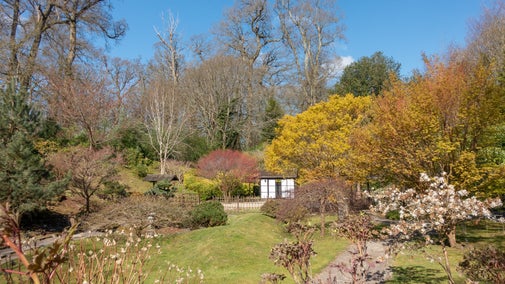
Discover the woodland, resident wildlife and historic carriage drive of the Kingston Lacy estate with this circular trail for walkers and cyclists.

Enjoy impressive views across the Dorset countryside on this circular walk, while discovering the history, flora and fauna of the Iron Age hillfort of Badbury Rings.

Enjoy a peaceful walk upstream along this picturesque stretch of the Stour river, with ancient woodland and an array of interesting birdlife to observe along the way.

Starting by an 18th-century mill, this moderate walk goes over rough pasture, alongside the River Stour, through the picturesque village of Shapwick and returns on lanes to White Mill.

Walk around the network of droves and along the tree-lined Beech Avenue at Kingston Lacy. This circular trail takes you back along the outskirts of the Kingston Lacy parkland.

Enjoy a gentle walk through the beautiful unspoilt villages of Pamphill and Cowgrove with good views across the Stour Valley.

This circular heathland walk covers one of the largest heath areas in Dorset, which is home to lots of wild flowers, birds, and all of the UK's reptile species.

Enjoy a relaxing circular walk through the water meadows by the River Stour at Kingston Lacy, taking in short stretches on scenic country lanes and along gravel tracks.

Sample the delicious menu at the Stables Café or visit the National Trust shop to browse a wide range of gifts, souvenirs and local produce. There's also a second-hand book store stocking a huge selection of titles, old and new.


An eye-catching thatched cottage on the Kingston Lacy estate, where you’ll find miles of footpaths through lush rolling countryside waiting to be explored.

A peaceful site surrounded by grassland and ancient trees on the Kingston Lacy estate, a short stroll from the house and gardens.

A picture-perfect thatch cottage with modern rustic interiors, close to Poole Harbour.
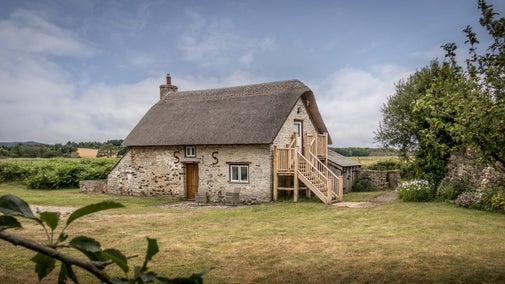
A charming, rustic conversion, this holiday cottage has wonky beams and countryside views.

A cosy cottage attached to the larger farmhouse, with views of open heath and woodland.

Five sea-view pitches in the grounds of an old dairy farm, with walks inland to the Purbeck hills or to Chapman’s Pool on the Jurassic Coast.
Slow down, get comfortable and come face-to-face with Rembrandt at Kingston Lacy.
Slow down, get comfortable and come face-to-face with Rembrandt at Kingston Lacy.
Design a unique print, a perfect gift for yourself or someone special. Robin Mackenzie will lead this workshop, perfect for beginners or those looking to build on their existing skills.
Join Rebecca Hellen, National Conservator for Visual Arts, for a talk which will take you behind the scenes to look at what is means to understand paintings through science and conservation.
Learn how to get the most out of your smartphone camera, fall in love with taking pictures, and capture the highlights of gardens on this smartphone photography workshop. Normal admission charges apply.
Join in the Easter fun this spring. Put on your bunny ears, complete the ten amazing activities around the the Easter adventure field before claiming your tasty prize. Normal admission applies.
Discover the ever changing Kingston Lacy woodlands and countryside and have the opportunity to meet new people on these gentle strolls, ranging from 3-4 miles (around 1.5 hours).
A walk filled with rich history and the opportunity to enjoy some areas of woodland not normally accessible. Distance: 7 miles, Time: approx. 3-4 hours.
Discover Kingston Lacy, an opulent family home built to resemble a Venetian Palace.
There’s plenty to see, from spectacular artworks to beautiful landscapes. Enjoy a summer picnic on the south lawn, or let little visitors run wild in nearby play areas. Wander through the Japanese Garden to the Kitchen Garden, which is being restored to Victorian splendour. Or explore the vast 8,500 acres of estate, featuring Iron Age hill forts, colourful heathland, water meadows and the world’s oldest pedigree herd of Red Ruby Devon cattle.
Kingston Lacy has a dynamic history. Over centuries the Bankes family built, altered, embellished and rebuilt their house. Their wealth came from extensive estates and profitable marriages, including inherited wealth from Caribbean plantations supported by the Atlantic slave trade.
William John Bankes created the house we know today between 1834 and his death in 1855. Forced into exile for homosexuality, at that time punishable by death, he lived in Venice and remotely remodelled the house, creating lavishly decorated interiors such as the spectacular Spanish Room. Displaying remarkable paintings by renowned artists such as Rubens, Van Dyck, Titian and Brueghel, the house is a miniature ‘national gallery’ for the South West, and includes Bankes' collection of ancient Egyptian artefacts, the largest private collection in the UK.
A vision from Venice nestled in a pocket of Dorset. Read about Kingston Lacy’s most influential owner who made it the important place you see today.
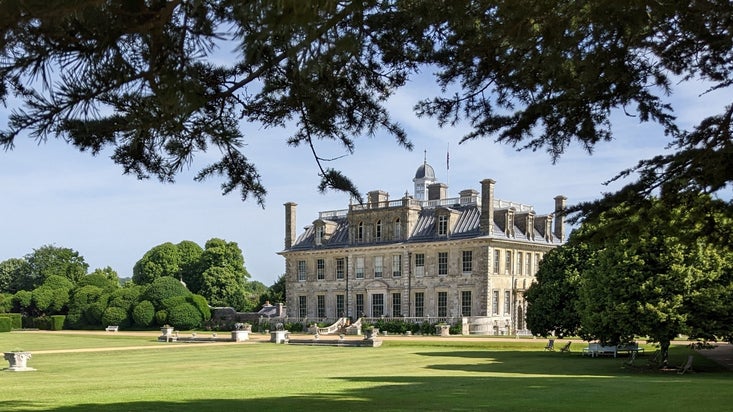
Learn about some of the prized items that are housed at Kingston Lacy, several of which feature in the National Trust's book 125 Treasures.

Discover how Kingston Lacy is encouraging biodiverse, resilient habitats for nature, yet with opportunities for people to explore the landscape.
Conservation work both indoors and out is a vital part of what the National Trust does at Kingston Lacy. Discover more about our latest initiatives.

Home Farm on the wider estate is home to the special Red Ruby Devon cows and rare breed Portland sheep. Find out why you’ll see them out on the Kingston Lacy estate.

There are numerous ways that you can volunteer with the National Trust at Kingston Lacy. Find out how to join our team.
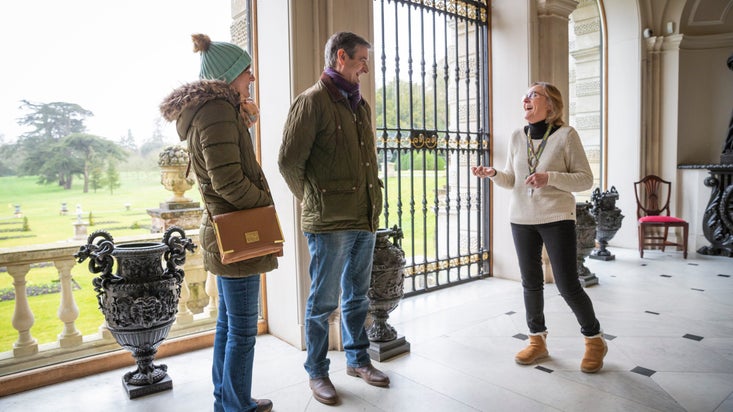

Join today and help protect nature, beauty and history – for everyone, for ever. Enjoy access to more than 500 places with National Trust membership.
By sharing your email address you’re agreeing to receive marketing emails from the National Trust and confirm you’re 18 years old or over. Please see our for more information on how we look after your personal data.